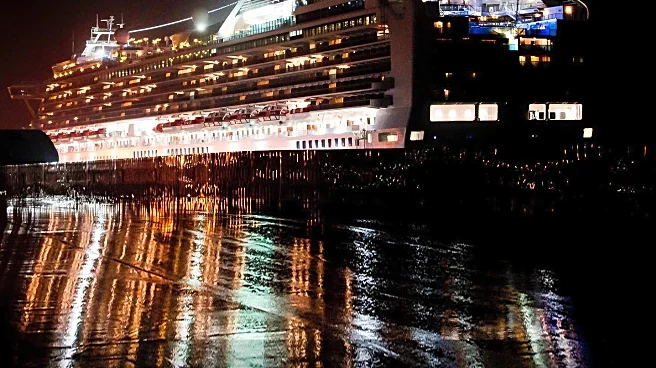What's Happening?
Residents of Victoria are urging local authorities to implement responsible cruise travel practices to mitigate the negative impacts of the growing cruise ship industry. Since 1999, the number of cruise ships visiting Victoria has increased from 34 to over 300 annually, bringing approximately 1 million passengers. This surge has led to increased noise, emissions, and wastewater affecting local communities and marine life. Despite these challenges, the Greater Victoria Harbour Authority and Victoria council have not significantly updated their operational practices. Residents are advocating for changes such as transitioning to electric shore power, reducing bus emissions, and improving waste management.
Why It's Important?
The call for action highlights the tension between economic benefits from tourism and environmental and social impacts on local communities. The cruise industry contributes significantly to Victoria's economy, but the environmental costs are becoming increasingly apparent. Addressing these issues is crucial for sustainable tourism development, balancing economic growth with the well-being of residents and the preservation of natural resources. Failure to act could lead to long-term damage to Victoria's environment and quality of life, potentially affecting its attractiveness as a tourist destination.
What's Next?
Residents propose several measures to address the impacts of cruise ships, including transitioning to electric buses and shore power, and improving waste management practices. These initiatives require collaboration between municipal, provincial, and federal governments. Victoria Coun. Susan Kim, a member of the Greater Victoria Harbour Authority board, is suggested to lead these efforts. The proposed changes aim to be implemented by the 2026 cruise season, with action plans drafted in 2025. These steps could set a precedent for other cities facing similar challenges.
Beyond the Headlines
The situation in Victoria reflects broader issues in the tourism industry, where economic gains often overshadow environmental and social costs. The push for sustainable practices in Victoria could inspire other regions to reevaluate their tourism strategies, emphasizing the importance of responsible travel. This shift could lead to a more balanced approach to tourism, prioritizing the interests of local communities and ecosystems.










